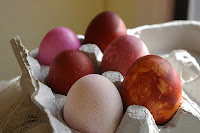Originally Easter eggs were painted with bright colors to represent the sunlight of spring and were used in Easter-egg rolling contests or given as gifts. After they were colored and etched with various designs the eggs were exchanged by lovers and romantic admirers, much the same as valentines. In medieval time eggs were traditionally given at Easter to the servants. In Germany eggs were given to children along with other Easter gifts.
Different cultures have developed their own ways of decorating Easter eggs. Crimson eggs, to honor the blood of Christ, are exchanged in Greece. In parts of Germany and Austria green eggs are used on Maundy Thursday (Holy Thursday). Slavic peoples decorate their eggs in special patterns of gold and silver.
Austrian artists design patterns by fastening ferns and tiny plants around the eggs, which are then boiled. The plants are then removed revealing a striking white pattern. The Poles and Ukrainians decorate eggs with simple designs and colors. A number of eggs are made in the distinctive manner called pysanki (to design, to write).
Pysanki eggs are a masterpiece of skill and workmanship. Melted beeswax is applied to the fresh white egg. It is then dipped in successive baths of dye. After each dip wax is painted over the area where the preceding color is to remain. Eventually a complex pattern of lines and colors emerges into a work of art.
In Germany and other countries eggs used for cooking where not broken, but the contents were removed by piercing the end of each egg with a needle and blowing the contents into a bowl. The hollow eggs were dyed and hung from shrubs and trees during the Easter Week. The Armenians would decorate hollow eggs with pictures of Christ, the Virgin Mary, and other religious designs.

No comments:
Post a Comment